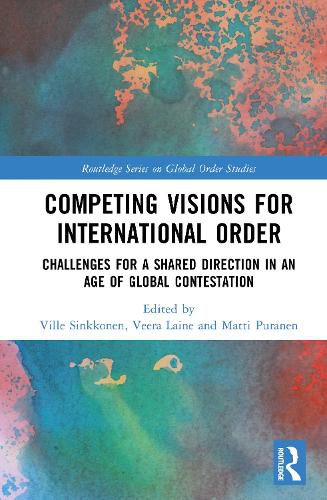Readings Newsletter
Become a Readings Member to make your shopping experience even easier.
Sign in or sign up for free!
You’re not far away from qualifying for FREE standard shipping within Australia
You’ve qualified for FREE standard shipping within Australia
The cart is loading…






This book explores the international ordering visions of key global and regional powers in the international system from 2014 onwards.
Using a four-fold analytical framework based on the distributional, normative, institutional and temporal dimensions of the visions propagated by the relevant political elites in the states/actors in question, the book addresses the ultimate question in international relations for the coming decades: to what extent can the visions pushed forward by the leading powers of the world be reconciled to arrive at a shared direction for international order writ large? The book's analysis also offers normative prescriptions on how to avoid a tragic race to the bottom - a fragmented world of competing orders where states are unable to address shared global crises and challenges such as pandemics, cross-border crime, climate tragedies, and armed conflict. With this, it concludes by recognising the importance of agency as well as political imagination in navigating the crisis-ridden ordering moment of the international system.
This book will be of key interest to scholars and students in global order studies and governance, geopolitics, regional studies, foreign policy analysis as well as more broadly to international relations and security, political history, human geography and policymakers.
$9.00 standard shipping within Australia
FREE standard shipping within Australia for orders over $100.00
Express & International shipping calculated at checkout
This book explores the international ordering visions of key global and regional powers in the international system from 2014 onwards.
Using a four-fold analytical framework based on the distributional, normative, institutional and temporal dimensions of the visions propagated by the relevant political elites in the states/actors in question, the book addresses the ultimate question in international relations for the coming decades: to what extent can the visions pushed forward by the leading powers of the world be reconciled to arrive at a shared direction for international order writ large? The book's analysis also offers normative prescriptions on how to avoid a tragic race to the bottom - a fragmented world of competing orders where states are unable to address shared global crises and challenges such as pandemics, cross-border crime, climate tragedies, and armed conflict. With this, it concludes by recognising the importance of agency as well as political imagination in navigating the crisis-ridden ordering moment of the international system.
This book will be of key interest to scholars and students in global order studies and governance, geopolitics, regional studies, foreign policy analysis as well as more broadly to international relations and security, political history, human geography and policymakers.